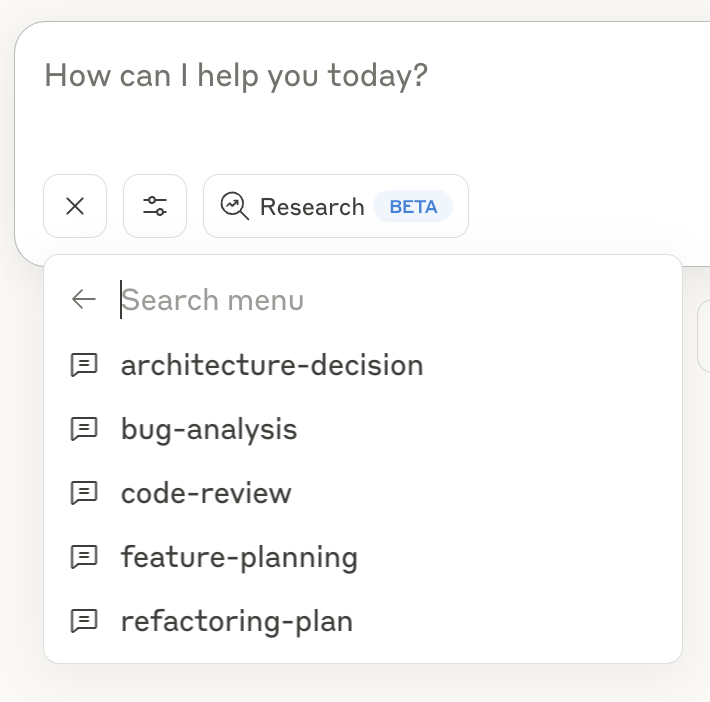A Model Context Protocol (MCP) server that enhances Claude's ability to solve complex programming tasks through structured, step-by-step thinking.
-
Configure Claude Desktop by editing:
- macOS:
~/Library/Application Support/Claude/claude_desktop_config.json - Windows:
%APPDATA%\Claude\claude_desktop_config.json - Linux:
~/.config/Claude/claude_desktop_config.json
{ "mcpServers": { "code-reasoning": { "command": "npx", "args": ["-y", "@mettamatt/code-reasoning"] } } } - macOS:
-
Configure VS Code:
{
"mcp": {
"servers": {
"code-reasoning": {
"command": "npx",
"args": ["-y", "@mettamatt/code-reasoning"]
}
}
}
}-
To trigger this MCP, append this to your chat messages:
Use sequential thinking to reason about this. -
Use ready-to-go prompts that trigger Code-Reasoning:
- Click the "+" icon in the Claude Desktop chat window, or in Claude Code type
/helpto see the specific commands. - Select "Add from Code Reasoning" from the available tools
- Choose a prompt template and fill in the required information
- Submit the form to add the prompt to your chat message and hit return
See the Prompts Guide for details on using the prompt templates.
-
--debug: Enable detailed logging -
--helpor-h: Show help information
- Programming Focus: Optimized for coding tasks and problem-solving
- Structured Thinking: Break down complex problems into manageable steps
- Thought Branching: Explore multiple solution paths in parallel
- Thought Revision: Refine earlier reasoning as understanding improves
- Safety Limits: Automatically stops after 20 thought steps to prevent loops
- Ready-to-Use Prompts: Pre-defined templates for common development tasks
Detailed documentation available in the docs directory:
- Usage Examples: Examples of sequential thinking with the MCP server
- Configuration Guide: All configuration options for the MCP server
- Prompts Guide: Using and customizing prompts with the MCP server
- Testing Framework: Testing information
├── index.ts # Entry point
├── src/ # Implementation source files
└── test/ # Testing framework
The Code Reasoning MCP Server includes a prompt evaluation system that assesses Claude's ability to follow the code reasoning prompts. This system allows:
- Testing different prompt variations against scenario problems
- Verifying parameter format adherence
- Scoring solution quality
- Generating comprehensive reports
To use the prompt evaluation system, run:
npm run evalSignificant effort went into developing the optimal prompt for the Code Reasoning server. The current implementation uses the HYBRID_DESIGN prompt, which emerged as the winner from our evaluation process.
We compared four different prompt designs:
| Prompt Design | Description |
|---|---|
| SEQUENTIAL | The original sequential thinking prompt design |
| DEFAULT | The baseline prompt previously used in the server |
| CODE_REASONING_0_30 | An experimental variant focusing on code-specific reasoning |
| HYBRID_DESIGN | A refined design incorporating the best elements of other approaches |
Our evaluation across seven diverse programming scenarios showed that HYBRID_DESIGN outperformed other prompts:
| Scenario | HYBRID_DESIGN | CODE_REASONING_0_30 | DEFAULT | SEQUENTIAL |
|---|---|---|---|---|
| Algorithm Selection | 87% | 82% | 88% | 82% |
| Bug Identification | 87% | 91% | 88% | 92% |
| Multi-Stage Implementation | 83% | 67% | 79% | 82% |
| System Design Analysis | 82% | 87% | 78% | 82% |
| Code Debugging Task | 92% | 87% | 92% | 92% |
| Compiler Optimization | 83% | 78% | 67% | 73% |
| Cache Strategy | 86% | 88% | 82% | 87% |
| Average | 86% | 83% | 82% | 84% |
The HYBRID_DESIGN prompt marginally demonstrated both the highest average solution quality (86%) and the most consistent performance across all scenarios, with no scores below 80%. It also prodouced the most thoughts. The src/server.ts file has been updated to use this optimal prompt design.
Personally, I think the biggest improvement was adding this to the end of the prompt: "✍️ End each thought by asking: "What am I missing or need to reconsider?"
See Testing Framework for more details on the prompt evaluation system.
This project is licensed under the MIT License. See the LICENSE file for details.



